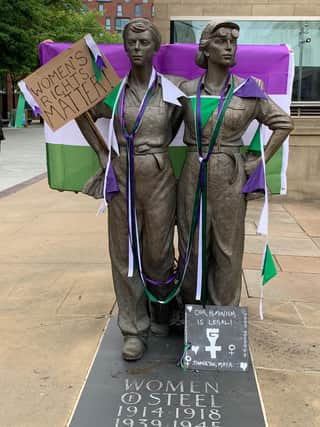We have the right to speak out and say so without fear of harassment


Everyone in our group has been part of national campaigns to retain female-only spaces in prisons, hospital wards, changing rooms and toilets, as provided for under the current provisions of the Equality Act 2010.
You may think ‘of course, sex matters’ – after all, isn’t it what makes the world go round? However, in these days of identity politics, belief in the binary sex divide between men and women has become a highly contested area, not just on social media, but in real life. Maya Forstater, the woman at the centre of the case we were celebrating and whose name you may never have heard before, lost her job because she tweeted that “male people are not women”. Earlier this month, Maya won her appeal in a case that enshrined in law that gender-critical beliefs are ‘worthy of respect in a civilised society’. In other words, we have the right to believe that it impossible to change sex and to question the idea that we all have a gender identity. Women and girls are oppressed on the basis of our biological sex, not our gender, which is a socially constructed set of behaviours based on sex, but which can change over time, unlike sex, which is immutable and binary – we are all males or females. Furthermore, sex is a protected characteristic in the Equality Act 2010.
Advertisement
Hide AdAdvertisement
Hide AdWe believe this case is really important because it clarifies that we have the right to not only believe that women and girls should be afforded the safety and dignity of single sex spaces, but also that we have the right to speak out and say so without fear of harassment, expulsion from real life and online groups or being accused of being ‘bigoted’. I am one of the founding members of the Labour Women’s Declaration, which now has over 6,000 signatories, and many of the founding signatories were gathered together on Saturday. We feel that this case vindicates the thousands of signatories to the seven statements in the Declaration which promote the rights of women to self-organise as a sex without harassment or fear.
We have the right to insist upon women-only services such as in rape crisis centres or to ask for female health practitioners – when denied that right because of the practise of including men identifying as women and prioritising their rights over those of women as enshrined in the Equality Act, some women will be excluded from receiving those services, either through fear of being triggered by males being present, by religious beliefs or through self-censorship. Women fleeing domestic violence or sexual crimes have to be able to get the help they need. Women in prison – who are often very vulnerable – have the right to be protected from violence or further harm, and women and girls should feel comfortable and safe using toilets and changing facilities. We aren’t asking for any extra rights; we are simply asking that the Equality Act is applied properly so that girls and women are protected from the potential for male violence. Safeguarding is an issue we take very seriously.
Already this year we have seen cases in English and Scottish courts against women simply for speaking of their gender-critical beliefs. Crimes like rape and sexual assault are being recorded as female crimes because the perpetrators have identified as women during or after their court cases. And we have seen the rape and sexual assault of female prisoners by men identifying as women who are held in women’s prisons. In the past week, men identifying as women have been included in women-only Olympic squads. They will undoubtedly take medals and life changing opportunities from other competitors. As one athlete said “inclusion should not be at the expense of others”, and yet that is exactly what is happening to women in many areas of our lives.
Too many women have suffered abuse or death threats for expressing these views and this has to stop. What we were celebrating on Saturday – and what we are talking about to other women in Sheffield - is that we now have protection of the law to express our beliefs and to demand women-only spaces and services. Our feminism is, indeed, legal!
For more information on the Forstater case click here
Advertisement
Hide AdAdvertisement
Hide AdFor more information on the Labour Women’s Declaration click here
The Declaration States:
1. Women and girls are subject to discrimination and oppression on the basis of their sex.
2. Women have the right to freedom of belief, freedom of expression and freedom of assembly (Articles 18, 19 and 20 of the UN Declaration of Human Rights).
3. Women have the right to discuss policies which affect them, without being abused, harassed or intimidated.
Advertisement
Hide AdAdvertisement
Hide Ad4. Women have the right to maintain their sex-based protections, as set out in the Equality Act 2010. These include female-only spaces such as changing rooms, hospital wards, sanitary and sleeping accommodation, refuges, hostels and prisons.
5. Women have the right to participate in single-sex sports, to ensure fairness and safety at all levels of competition.
6. Women have the right to organise themselves, as a sex, across a range of cultural, leisure, educational and political activities.
7. We condemn all attempts to undermine or limit the rights of women to self-organise and call on the Labour Party and the trades union movement to actively support these essential freedoms.